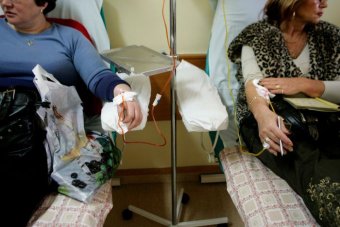
New research shows simple brain training could be the first step in combating memory and concentration problems caused by chemotherapy.
Patients often experience these side effects years after finishing treatment.
University of Sydney researcher Victoria Bray told a conference in Hobart that 40 minutes of quizzes and puzzles four times a week could be the cure to ongoing cognitive impairment.
Dr Bray conducted a trial of 122 patients who completed online quizzes and puzzles, and compared their results to people who received no brain training.
“Until this point there really were no proven treatments to address this difficult problem, so it’s certainly a potential new treatment offered,” she said.
“Some of the challenges ahead lie in [finding out] who are the cancer patients that are particularly susceptible, and can we intervene earlier?”
Dr Bray said patients also showed improvements in levels of anxiety and depression, stress and fatigue.
Karen Forster beat breast cancer 15 years ago after undertaking six months of chemotherapy, but she was not completely in the clear.
The chemotherapy left her with years of memory and concentration problems.
“You sort of start to think that you’re perhaps losing it a bit I think, and begin to doubt yourself,” Ms Forster said.
Tasks such as writing shopping lists soon became her biggest hurdle.

“I was a mother with teenage children, but I forgot things and I found it hard to remember some of the most basic things,” she said.
“I’d always been the person who could go to the shop and remembered what I wanted, but I couldn’t do those sorts of things.
“Difficulty in concentrating was probably the most significant thing. You’d start on a task and then get sidetracked and completely off what you started with.”
Ms Forster went back to studying at university in order to train her brain.
“Even now I still need to keep my brain active and not let it get the better of me,” she said.
Researchers at the conference also tabled findings that moderate exercise could save cancer sufferers an average of $60 per week in reduced medical expenses.
Professor Prue Cormie from the Australian Catholic University told the conference that one sufferer who used to be too fragile to pick up a cup of tea reported benefits to the increase in activity.
“After the exercise program he was able to function normally, to shave, to brush his teeth, to hold a cup of tea, to eat a burger – all these normal things that we take for granted,” Prof. Cormie said.
